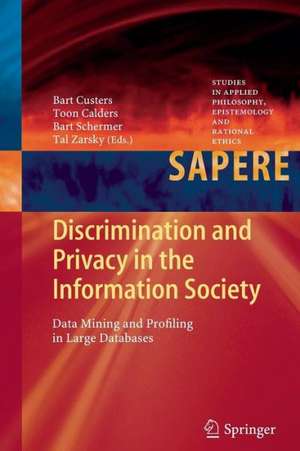Discrimination and Privacy in the Information Society: Data Mining and Profiling in Large Databases: Studies in Applied Philosophy, Epistemology and Rational Ethics, cartea 3
Editat de Bart Custers, Toon Calders, Bart Schermer, Tal Zarskyen Limba Engleză Paperback – 20 sep 2014
Processing vast amounts of data may lead to situations in which data controllers know many of the characteristics, behaviors and whereabouts of people. In some cases, analysts might know more about individuals than these individuals know about themselves. Judging people by their digital identities sheds a different light on our views of privacy and data protection.
This book discusses discrimination and privacy issues related to data mining and profiling practices. It provides technological and regulatory solutions, to problems which arise in these innovative contexts. The book explains that common measures for mitigating privacy and discrimination, such as access controls and anonymity, fail to properly resolve privacy and discrimination concerns. Therefore, new solutions, focusing on technology design, transparency and accountability are called for and set forth.
| Toate formatele și edițiile | Preț | Express |
|---|---|---|
| Paperback (1) | 991.46 lei 6-8 săpt. | |
| Springer Berlin, Heidelberg – 20 sep 2014 | 991.46 lei 6-8 săpt. | |
| Hardback (1) | 996.22 lei 6-8 săpt. | |
| Springer Berlin, Heidelberg – 12 aug 2012 | 996.22 lei 6-8 săpt. |
Din seria Studies in Applied Philosophy, Epistemology and Rational Ethics
- 20%
 Preț: 603.90 lei
Preț: 603.90 lei -
 Preț: 397.59 lei
Preț: 397.59 lei -
 Preț: 359.54 lei
Preț: 359.54 lei - 20%
 Preț: 989.96 lei
Preț: 989.96 lei - 24%
 Preț: 787.50 lei
Preț: 787.50 lei -
 Preț: 390.08 lei
Preț: 390.08 lei -
 Preț: 370.88 lei
Preț: 370.88 lei - 15%
 Preț: 641.20 lei
Preț: 641.20 lei - 20%
 Preț: 991.60 lei
Preț: 991.60 lei - 20%
 Preț: 646.95 lei
Preț: 646.95 lei - 15%
 Preț: 653.98 lei
Preț: 653.98 lei -
 Preț: 384.48 lei
Preț: 384.48 lei -
 Preț: 395.47 lei
Preț: 395.47 lei - 18%
 Preț: 1216.95 lei
Preț: 1216.95 lei - 18%
 Preț: 947.50 lei
Preț: 947.50 lei -
 Preț: 388.72 lei
Preț: 388.72 lei -
 Preț: 390.08 lei
Preț: 390.08 lei -
 Preț: 395.09 lei
Preț: 395.09 lei -
 Preț: 394.12 lei
Preț: 394.12 lei - 15%
 Preț: 644.82 lei
Preț: 644.82 lei - 15%
 Preț: 698.15 lei
Preț: 698.15 lei - 18%
 Preț: 1840.91 lei
Preț: 1840.91 lei - 20%
 Preț: 656.84 lei
Preț: 656.84 lei -
 Preț: 389.70 lei
Preț: 389.70 lei - 15%
 Preț: 585.73 lei
Preț: 585.73 lei - 15%
 Preț: 711.40 lei
Preț: 711.40 lei - 15%
 Preț: 589.33 lei
Preț: 589.33 lei - 15%
 Preț: 700.42 lei
Preț: 700.42 lei
Preț: 991.46 lei
Preț vechi: 1239.33 lei
-20% Nou
Puncte Express: 1487
Preț estimativ în valută:
189.71€ • 198.09$ • 156.66£
189.71€ • 198.09$ • 156.66£
Carte tipărită la comandă
Livrare economică 15-29 aprilie
Preluare comenzi: 021 569.72.76
Specificații
ISBN-13: 9783642441134
ISBN-10: 3642441130
Pagini: 388
Ilustrații: XVIII, 370 p.
Dimensiuni: 155 x 235 x 20 mm
Greutate: 0.54 kg
Ediția:2013
Editura: Springer Berlin, Heidelberg
Colecția Springer
Seria Studies in Applied Philosophy, Epistemology and Rational Ethics
Locul publicării:Berlin, Heidelberg, Germany
ISBN-10: 3642441130
Pagini: 388
Ilustrații: XVIII, 370 p.
Dimensiuni: 155 x 235 x 20 mm
Greutate: 0.54 kg
Ediția:2013
Editura: Springer Berlin, Heidelberg
Colecția Springer
Seria Studies in Applied Philosophy, Epistemology and Rational Ethics
Locul publicării:Berlin, Heidelberg, Germany
Public țintă
ResearchCuprins
Part I Opportunities of Data Mining and Profiling.- Part II Possible Discrimination and Privacy Issues.- Part III Practical Applications.- Part IV Solutions in Code.- Part V Solutions in Law, Norms and the Market.
Textul de pe ultima copertă
Vast amounts of data are nowadays collected, stored and processed, in an effort to assist in making a variety of administrative and governmental decisions. These innovative steps considerably improve the speed, effectiveness and quality of decisions. Analyses are increasingly performed by data mining and profiling technologies that statistically and automatically determine patterns and trends. However, when such practices lead to unwanted or unjustified selections, they may result in unacceptable forms of discrimination.
Processing vast amounts of data may lead to situations in which data controllers know many of the characteristics, behaviors and whereabouts of people. In some cases, analysts might know more about individuals than these individuals know about themselves. Judging people by their digital identities sheds a different light on our views of privacy and data protection.
This book discusses discrimination and privacy issues related to data mining and profiling practices. It provides technological and regulatory solutions, to problems which arise in these innovative contexts. The book explains that common measures for mitigating privacy and discrimination, such as access controls and anonymity, fail to properly resolve privacy and discrimination concerns. Therefore, new solutions, focusing on technology design, transparency and accountability are called for and set forth.
Processing vast amounts of data may lead to situations in which data controllers know many of the characteristics, behaviors and whereabouts of people. In some cases, analysts might know more about individuals than these individuals know about themselves. Judging people by their digital identities sheds a different light on our views of privacy and data protection.
This book discusses discrimination and privacy issues related to data mining and profiling practices. It provides technological and regulatory solutions, to problems which arise in these innovative contexts. The book explains that common measures for mitigating privacy and discrimination, such as access controls and anonymity, fail to properly resolve privacy and discrimination concerns. Therefore, new solutions, focusing on technology design, transparency and accountability are called for and set forth.
Caracteristici
Latest technological developments in data mining and profiling Interesting for information scientists as well as for law, ethics, sociology, politics and public administration, and other people who may be confronted with large amounts of information in their work Written by leading experts in the field

















